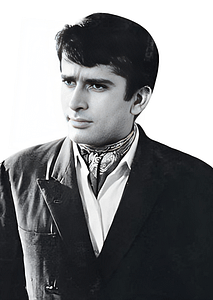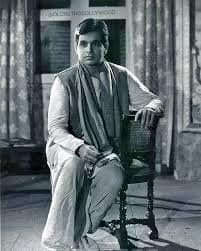Shashi Kapoor Early Life and Family Background

Shashi Kapoor, born Balbir Raj Kapoor on March 18, 1938, in Calcutta (now Kolkata), India, was the youngest son of Prithviraj Kapoor, a towering figure in Indian theatre and cinema, and the brother of Raj Kapoor and Shammi Kapoor, both celebrated actors in their own right. He grew up in a family that was not just involved in cinema, but virtually defined the early contours of the Hindi film industry.
His early exposure to acting came through his father’s Prithvi Theatres, a traveling theatre company that staged socially relevant plays across the country. Kapoor started performing on stage at the age of four and quickly developed a deep passion for acting. As a child actor, he appeared in several films under the name “Shashiraj,” including Aag (1948) and Awara (1951), both directed by and starring his elder brother Raj Kapoor.
His childhood was marked by the influence of a disciplined theatrical environment, fostering his sensibility for both art and professionalism. Though born into privilege in the Indian film industry, Shashi Kapoor carved his own niche through talent, determination, and an openness to experimentation.
Shashi Kapoor Entry into Films and Rise to Stardom
Shashi Kapoor made his debut as a leading man in the 1961 film Dharmputra, directed by Yash Chopra. While the film did not do well commercially, it established him as an actor with immense potential. His early years saw a slow build-up, but his good looks, charming screen presence, and acting skills quickly made him popular among filmmakers and audiences.
His breakthrough came with films like Jab Jab Phool Khile (1965), where he played a Kashmiri boatman who falls in love with a rich tourist, and Waqt (1965), one of Bollywood’s early multi-starrer blockbusters. Kapoor soon became one of the most sought-after actors of the 1960s and 1970s.
Shashi Kapoor was known for his romantic hero persona. With his dashing appearance and refined demeanor, he starred opposite all the top heroines of the time, including Nanda, Sharmila Tagore, Hema Malini, and Rakhee. His onscreen chemistry with actress Nanda was particularly well-received, with the pair working together in several films like Mohabbat Isko Kehte Hain (1965) and Neend Hamari Khwab Tumhare (1966).
A Versatile Actor and International Face of Indian Cinema
Shashi Kapoor’s career was notable for his versatility. He seamlessly transitioned between romantic roles, serious dramas, and action-packed thrillers. He also worked in many parallel cinema productions, collaborating with directors like Shyam Benegal and Govind Nihalani. Films such as New Delhi Times (1986), for which he won the National Film Award for Best Actor, showcased his ability to handle complex characters.
One of the most groundbreaking aspects of Shashi Kapoor’s career was his involvement in international cinema. He was among the first Indian actors to successfully venture into English-language films, acting in several Merchant-Ivory Productions. His collaborations with the legendary duo James Ivory and Ismail Merchant include critically acclaimed films such as:
- The Householder (1963)
- Shakespeare Wallah (1965)
- Bombay Talkie (1970)
- Heat and Dust (1983)
These films not only broadened Kapoor’s horizons as an actor but also helped introduce Indian cinema to global audiences. His wife, Jennifer Kendal, a British actress and member of the Shakespearean theatrical troupe Shakespeareana, often co-starred in these projects.
Marriage and Family Life
In 1958, Shashi Kapoor married Jennifer Kendal, whom he had met in Kolkata when he was working with Prithvi Theatres and she was touring India with her family’s troupe. Their relationship blossomed through their shared love of theatre and acting. The couple married against some resistance, given their different cultural backgrounds, but they remained deeply devoted to each other throughout their lives.
Shashi and Jennifer had three children: Kunal, Karan, and Sanjana. Jennifer was not just his life partner but also a key influence in shaping his artistic sensibilities. Together, they revived Prithvi Theatre in Mumbai in 1978, establishing it as a hub for serious, experimental, and socially relevant theatre. The Prithvi Theatre continues to be one of the most respected venues for Indian theatre artists.
Tragically, Jennifer passed away from cancer in 1984, a loss that deeply affected Kapoor. He withdrew from public life and acting for a while, and his health began to decline in the years that followed.
Shashi Kapoor the Producer: A Commitment to Good Cinema
Dissatisfied with the formulaic nature of mainstream Bollywood, Shashi Kapoor ventured into film production in the late 1970s under his banner Film-Valas. His aim was to create meaningful cinema that blended artistic integrity with entertainment.
Some of the notable films he produced include:
- Junoon (1978): Directed by Shyam Benegal, set during the Indian Rebellion of 1857.
- Kalyug (1981): A modern retelling of the Mahabharata in a corporate setting.
- 36 Chowringhee Lane (1981): A poignant film about an aging Anglo-Indian teacher, played brilliantly by Jennifer Kendal.
- Vijeta (1982): A film about a young man’s journey of self-discovery in the Indian Air Force.
- Utsav (1984): Based on a Sanskrit play, produced with high artistic values.
Though not always commercially successful, these films are regarded as classics today and showcase Kapoor’s vision for a more evolved and artistic Indian cinema.
Later Years and Recognition
In the late 1980s and early 1990s, Kapoor gradually moved away from acting. He took fewer roles, and his last notable film appearance was in Jinnah (1998), in which he played the elder version of Muhammad Ali Jinnah, the founder of Pakistan.
Over time, Kapoor became reclusive, particularly after the passing of Jennifer. He battled various health issues, including a prolonged struggle with a liver ailment. Despite his fading public presence, Kapoor remained an icon in Indian cinema and was regularly remembered for his contributions to film and theatre.
In recognition of his immense contribution to Indian and world cinema, Shashi Kapoor received numerous awards and accolades:
- National Film Award for Best Actor for New Delhi Times (1986)
- Filmfare Lifetime Achievement Award (2010)
- Padma Bhushan, India’s third-highest civilian award (2011)
- Dadasaheb Phalke Award (2014): India’s highest honor in cinema
These awards underscored not just his popularity, but his deep and lasting impact on the arts in India.
Death and Legacy
Shashi Kapoor passed away on December 4, 2017, in Mumbai at the age of 79. His death marked the end of an era, and tributes poured in from across the world. The Indian film fraternity remembered him as a gentleman actor, a dedicated artist, and a pioneer who dared to bridge the worlds of commercial and parallel cinema.
His funeral was attended by numerous stars, politicians, and fans, and he was accorded a state funeral by the Government of India, reflecting the esteem in which he was held.
Kapoor’s legacy lives on through his children—Kunal Kapoor and Karan Kapoor, who had brief stints in the film industry, and Sanjana Kapoor, who remains closely associated with Prithvi Theatre and is a staunch promoter of theatre arts in India.
The revival of Prithvi Theatre remains one of his most significant contributions. It continues to provide a platform for young and upcoming actors, writers, and directors to express themselves outside the constraints of mainstream cinema. Through this institution, Kapoor’s dream of a vibrant, experimental, and inclusive Indian theatre lives on.
Conclusion
Shashi Kapoor’s life was a tapestry woven with talent, vision, and passion. An actor who comfortably straddled the worlds of Bollywood and world cinema, Kapoor was much more than just a matinee idol. He was a bridge between tradition and modernity, art and commerce, East and West.
His romantic on-screen image, his dashing persona, and his charming smile made him a heartthrob, but it was his deeper commitment to meaningful cinema and theatre that made him a true icon.
From his childhood days on stage with Prithvi Theatres to international acclaim through Merchant-Ivory films, and his legacy in reviving Indian theatre, Shashi Kapoor’s journey is a story of cultural richness and artistic integrity. He was not just a member of India’s greatest film dynasty—he was a torchbearer of its finest values.
In the annals of Indian cinema, Shashi Kapoor remains not just a beloved star, but a beacon of class, courage, and creative commitment.




3 thoughts on “Shashi Kapoor: A Life in Cinema (Biography Daddy)”